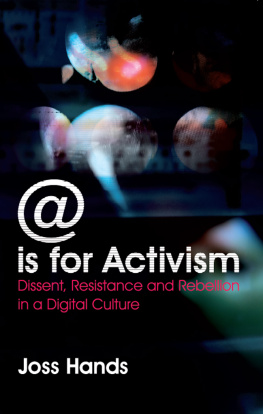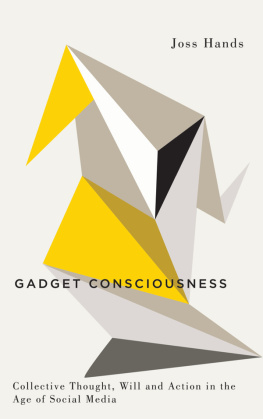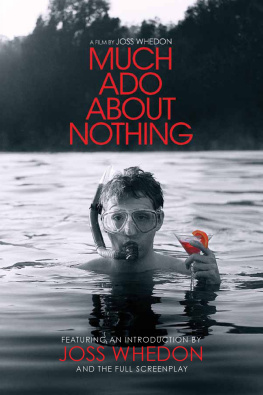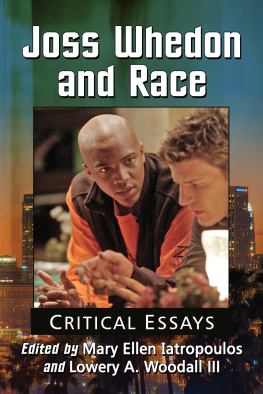Joss Hands - @ is for Activism
Here you can read online Joss Hands - @ is for Activism full text of the book (entire story) in english for free. Download pdf and epub, get meaning, cover and reviews about this ebook. publisher: Pluto Press, genre: Romance novel. Description of the work, (preface) as well as reviews are available. Best literature library LitArk.com created for fans of good reading and offers a wide selection of genres:
Romance novel
Science fiction
Adventure
Detective
Science
History
Home and family
Prose
Art
Politics
Computer
Non-fiction
Religion
Business
Children
Humor
Choose a favorite category and find really read worthwhile books. Enjoy immersion in the world of imagination, feel the emotions of the characters or learn something new for yourself, make an fascinating discovery.
- Book:@ is for Activism
- Author:
- Publisher:Pluto Press
- Genre:
- Rating:3 / 5
- Favourites:Add to favourites
- Your mark:
- 60
- 1
- 2
- 3
- 4
- 5
@ is for Activism: summary, description and annotation
We offer to read an annotation, description, summary or preface (depends on what the author of the book "@ is for Activism" wrote himself). If you haven't found the necessary information about the book — write in the comments, we will try to find it.
Joss Hands: author's other books
Who wrote @ is for Activism? Find out the surname, the name of the author of the book and a list of all author's works by series.
@ is for Activism — read online for free the complete book (whole text) full work
Below is the text of the book, divided by pages. System saving the place of the last page read, allows you to conveniently read the book "@ is for Activism" online for free, without having to search again every time where you left off. Put a bookmark, and you can go to the page where you finished reading at any time.
Font size:
Interval:
Bookmark:
For special offers, author updates, new title info and more there are plenty of ways to stay in touch with Pluto Press.
Our Website: http://www.plutobooks.com
Our Blog: http://plutopress.wordpress.com
Our Facebook: http://www.facebook.com/PlutoPress
Our Twitter: http://twitter.com/plutopress


First published 2011 by Pluto Press
345 Archway Road, London N6 5AA and
175 Fifth Avenue, New York, NY 10010
www.plutobooks.com
Distributed in the United States of America exclusively by
Palgrave Macmillan, a division of St. Martins Press LLC,
175 Fifth Avenue, New York, NY 10010
Copyright Joss Hands 2011
The right of Joss Hands to be identified as the author of this work has been
asserted by him in accordance with the Copyright, Designs and Patents Act 1988.
British Library Cataloguing in Publication Data
A catalogue record for this book is available from the British Library
ISBN 978 0 7453 2701 3 Hardback
ISBN 978 0 7453 2700 6 Paperback
ISBN 978 1 7837 1051 5 ePub
Library of Congress Cataloging in Publication Data applied for
This book is printed on paper suitable for recycling and made from fully managed
and sustained forest sources. Logging, pulping and manufacturing processes are
expected to conform to the environmental standards of the country of origin.
10 9 8 7 6 5 4 3 2
Designed and produced for Pluto Press by
Chase Publishing Services Ltd, 33 Livonia Road, Sidmouth, EX10 9JB, England
Typeset from disk by Stanford DTP Services, Northampton, England
Printed and bound in the European Union by
CPI Antony Rowe, Chippenham and Eastbourne
Many thanks to all those friends and colleagues who have given their time to discuss the book in progress, and who have read and commented on chapters: Sarah Barrow, Sean Campbell, Neal Curtis, Lincoln Dahlberg, Greg Elmer, Tanya Horeck, Tina Kendall, Clare Neal, Jussi Parikka, Eugenia Siapera, Catherine Silverstone and Milla Tiainen. Further thanks to all my colleagues, present and past, in the Department of English, Communication, Film and Media at Anglia Ruskin University, Cambridge, and to my teachers and colleagues at the Manchester Metropolitan University, Cheshire in particular Dave Roberts, Joss West-Burnham and Michael Loughlin. My appreciation goes to Douglas Kellner, and the anonymous reviewers, for their comments on the original book proposal. I am indebted to David Castle for supporting the project so well at Pluto Press, and to Charles Peyton for his great work getting the manuscript into shape. I would also like to thank Jason Cox, Mark and Jacky Heron, and Nev and Ibis Kirton, for their ideas, support and friendship through the writing of this book. Finally, thanks to my parents Bryan and Marilyn, and to my grandmother Esther, whose attitude to life one can only aspire to emulate.
On Monday 15 June 2009, the Twitter Blog announced that it would be postponing a planned maintenance shutdown, given the recognition of the role Twitter is currently playing as an important communication tool in Iran (Twitter, 2009). On the same day as Twitters postponed maintenance, the New York Times reported that Iranians are blogging, posting to Facebook and most visibly coordinating their protests on Twitter, the messaging service (Stone & Cohen, 2009).
This was a response to the widespread unrest in Iran in the aftermath of the perceived fixing of the presidential election. Reports of unrest, street protests and images of youth thronging the streets, chanting demands for the election results to be fairly recognised and taking on the phalanxes of armed police, were flashed around the world. The tag line of the story, in tune with increasing awareness of the social networking phenomenon of Twitter, was the notion that this was a radically new kind of protest, coordinated online in real time and producing a new kind of collective intelligence. That this was taken very seriously cannot be denied, given that two days after the Twitter Blog post the Guardian reported that the new Obama administration had requested a planned downtime be deferred: The Obama administration, while insisting it is not meddling in Iran, yesterday confirmed it had asked Twitter to remain open to help anti-government protesters (MacAskill, 2009).
This was not the first time that Twitter had been seen to contribute to such actions. Earlier, in April 2009, there had been the Twitter Revolution in Moldova, in which for a while protesters, again reacting against a perceived rigged election, had occupied the Moldovan parliament. The New York Times reported that [a] crowd of more than 10,000 young Moldovans materialized seemingly out of nowhere on Tuesday to protest against Moldovas Communist leadership, ransacking government buildings and clashing with the police (Barry, 2009). But this was no mystery event; the protesters had organised themselves using Twitter, among other social media. The Independent newspaper reported that one protester had tweeted: North of Moldova TV IS OFF!!! but we have THE ALMIGHTY INTERNET! Let us use it to communicate peacefully for freedom!! And one of the protest leaders, Natalia Morar, claimed, All the organisation was through the Internet, and 15,000 people came on to the street (Walker, 2009).
Yet it did not take long before the story of Twitter had been taken in the other direction, when Daily Telegraph commentator Will Heaven claimed that in Iran the Twitter revolution has made things worse (Heaven, 2009), and that the hype had been badly overplayed, evidenced by the government crackdown on the protests, and the belief that they had failed to achieve anything other than bring about an even greater state repression. Such a negative view seems rather curious given the underlying point that Twitter had provoked the authorities to action, which in itself suggests that it had actually been a success in generating a threat to those in power. While it is very easy in the early days of a new medium to imagine it is at the roots of all social change, to dismiss it seems equally naive, and we do have early examples where Twitter has succeeded.
For example, we can see a related phenomenon in the case of the Guardian Newspaper vs. Carter-Ruck and Trafigura. While the Twitterverse responded to the protests in Iran with broad global support, but with uncertain effect, this case was different. An attempt to silence free speech, and its overturning in response, was played out in real time on the screens of thousands of Twitter users. The Guardians editor Alan Rusbridger tweeted at 9.05 p.m. on Monday, 12 October 2009 that the Guardian [was] prevented from reporting parliament for unreportable reasons; at 9.49 a.m. the following morning he reported that the Guardian was hoping to get into court today. This message began to spread through Twitter; at 9.57 a.m. Stephen Fry a well-known writer and performer with over half a million Twitter followers at the time tweeted that there had been an outrageous gagging order, and the cascade of support spread from there. By mid-morning CarterRuck was the most discussed and mentioned subject on Twitter, and by midday Carter-Ruck and Trafigura had caved, Alan Rusbridger was able to claim victory, and the full details were revealed. Was this, as has been claimed, a victory for Twitter?
Undoubtedly it showed the futility of trying to keep a secret, because the parliamentary question that was not allowed to be reported had been sought out by the many Twitter users, and was freely circulating through Twitter by 10 p.m. on Monday night. Whether Twitter can be credited with ensuring freedom of speech is less clear; this was a very specific case in which such bad publicity for Trafigura was not a price worth paying. In that regard the story followed a satisfying narrative that made for a compelling news item.
Font size:
Interval:
Bookmark:
Similar books «@ is for Activism»
Look at similar books to @ is for Activism. We have selected literature similar in name and meaning in the hope of providing readers with more options to find new, interesting, not yet read works.
Discussion, reviews of the book @ is for Activism and just readers' own opinions. Leave your comments, write what you think about the work, its meaning or the main characters. Specify what exactly you liked and what you didn't like, and why you think so.












